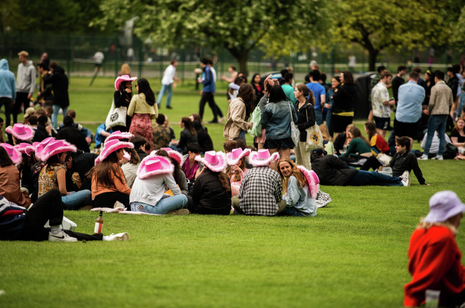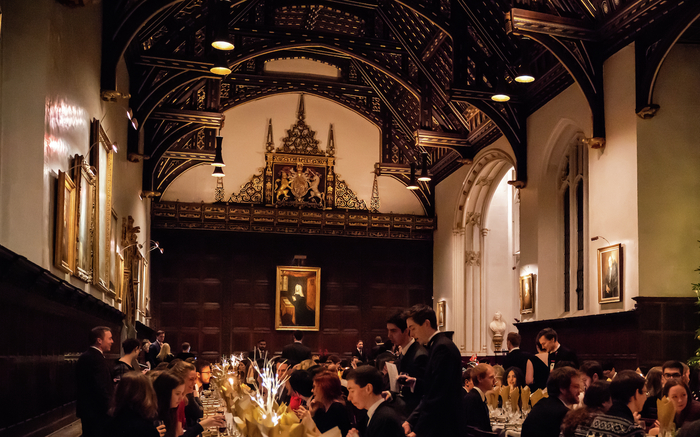‘All-male ones are worse’: Are some drinking societies better than others?
Should we let women and non-binary drinking societies off the hook?

In Michaelmas, a Varsity article about the activities of Downing’s all-male drinking society got picked up by The Times. Following on from similar exposés in the past, the coverage centred around the treatment of women by these groups. In this instance, a porter at Downing had discovered letters in the pidges of female freshers ‘deemed attractive’ by the male members, inviting them to a swap with the theme ‘Anything But Clothes’.
It shouldn’t take a sociology student (me) to explain why that’s inappropriate. Apparently, the Master of Downing, Alan Bookbinder, didn’t need one either. He sent an email around the whole College reiterating the ban on drinking societies, attacking their exclusive nature. His focus was on the entitled misogyny of the invitation, on yet another example of toxic masculinity. The main concern of national media, Camfess and Varsity comment sections was the same. But I happened to know that the women and non-binary drinking society at Downing had sent a similar letter to male freshers, which hadn’t been discovered.
Of course, these things don’t happen in a vacuum. There are systemic power configurations that mean certain individuals and groups hold more power in certain settings, and that render their actions towards less powerful groups uniquely harmful. In this case, a group of men identifying ‘attractive’ women to invite to an event ties into a long, long history of men judging women and non-binary people according to a restrictive standard of female beauty in a manner which divides and degrades.
Conversely, doesn’t it take away agency to completely let non-male drinking societies off the hook? If drinking society culture in Cambridge is as patriarchal as they say, how do women and non-binary people justify their involvement? It might be true that non-male drinking societies are better behaved and more inclusive that their more infamous counterparts – or, that assumption might itself be rooted in misogyny. To find out, I spoke to people across Cambridge from all sides of this very old divide.
“I just like to have fun. There’s nothing wrong with that”
The first person I spoke to was Amy, a member of Medwards’ drinking society. She seemed to have an answer readily prepared. “People make way too much fuss about this,” she complained: “I think drinking socs have been blown up into this huge serious issue, when really it’s just a bunch of undergrads making friends, going out and wearing silly outfits.” Has Amy, who identifies as a feminist, ever felt her values compromised by her membership? She laughed. “I like to have fun. There’s nothing wrong with that.”
The next person I spoke to is a member of Downing’s Orchids, a women and non-binary drinking society with an unusual history. The Orchids, according to people I’ve spoken to and my own late-night trawling of Varsity’s archives, used to be one of the most toxic and exclusive societies of the lot. But, in late 2020, it underwent a reformation to become completely open access, running events on a first-come, first-served basis with a no-pressure policy on alcohol. Bella, an Orchids member who “never drinks more than one or two units at an event” said she always felt welcomed and included, and that the presidents had taken care to organise games that didn’t exert pressure on anyone to drink heavily.
Bella also made an interesting point about unequal levels of pressure. “The men’s societies have never responded to criticism about inclusivity, from student journalists or otherwise. They don’t care. Women and non-binary societies at least try.”
“The all-male ones are worse. But to say the women’s ones are inclusive is going too far”
A former member of another college’s women and non-binary drinking society, Naomi, thought that drinking societies, by nature, could not be inclusive or progressive. While we were talking, she got out her phone and showed me the Instagram page of her former society. “Look,” she said, scrolling down through the years: “It’s, like, fifteen of the same person.” She wasn’t wrong – although this was a society that had been ‘inclusive’ for several years, the membership was limited to white, conventionally attractive girls.
Naomi told me some more about her experience. “My friend and I were pretty much the only people of colour at the introductory event. I had fun, but as soon as we started going to swaps it was very quickly apparent that drinking society culture is a white space in Cambridge. I left pretty quickly, and I don’t feel like my social life has suffered at all.” I asked her if she thought women and non-binary societies were doing anything better than the men’s. “The all-male ones are worse,” she said, thoughtfully “but to say the women’s ones are inclusive is going too far.”
Several of Naomi’s friends agreed with her. Alina, who is still a member, said that it was the sexualised aspect of drinking society swaps that hindered claims to inclusivity. “I’m not straight or white, and the swaps are only ever with all-male societies. They’re basically set up like mating rituals, to be honest. So, Western patriarchal beauty standards and heteronormativity are obviously going to come into it, no matter how inclusive the women and non-binary drinking socs try to be.”
“Most non-binary people and gay men choose not to join men’s drinking societies”
Oliver, who identifies as non-binary, told me about their experience in a mixed college. “I had friends in the older years who were in the all-male drinking society, but I was only invited to the women’s one. I wasn’t bothered because I’d have chosen it anyway, but I did think it was interesting that most non-binary people and gay men choose not to join men’s drinking societies.”
Parker, a member of the men’s drinking society at Oliver’s college, said that he asked the gay and non-binary prospective members whether they’d like to be part of the men’s society, but that they usually chose the women’s. One of my NatSci friends later informed me that male homosocial bonding is generally predicated on performing a certain ‘hegemonic’ standard of masculinity, which excludes those who don’t engage in the performance. That would explain why men’s societies tend to be more exclusive, and why women and non-binary inclusive societies who they go on swaps with become self-selecting according to a restrictive standard of patriarchal beauty.
But, that all seems a bit reductive. Parker tells me a story about an interaction between one of his friends and a women’s drinking society this year. “They were ranking our members according to how attractive they were, and then they all got bad pictures of the guy they decided was least attractive and made him their phone screen background. That was completely of their own accord – it wasn’t as if we asked them to do that at a swap or anything. I don’t think he was supposed to find out, but he did. I thought it was pretty awful.”
The last person I spoke to was Ella, a graduate of Pembroke who regrets her former involvement in a drinking society. “I think people are trying, but it’s not enough. Whatever your stance is on drinking societies, you can’t argue that having a more diverse membership magically makes them inclusive spaces.”
All student names have been changed.
 News / Colleges charge different rents for the same Castle Street accommodation2 March 2026
News / Colleges charge different rents for the same Castle Street accommodation2 March 2026 News / News in Brief: waterworks, wine woes, and workplace wins 1 March 2026
News / News in Brief: waterworks, wine woes, and workplace wins 1 March 2026 News / Climate activists protest for ‘ethical careers policy’1 March 2026
News / Climate activists protest for ‘ethical careers policy’1 March 2026 News / Angela Merkel among Cambridge honorary degree nominees27 February 2026
News / Angela Merkel among Cambridge honorary degree nominees27 February 2026 News / Private school teacher who lied about Cambridge degree barred from teaching27 February 2026
News / Private school teacher who lied about Cambridge degree barred from teaching27 February 2026









